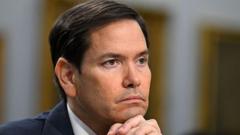As visa access dwindles and funding for research shrinks under the Trump administration, American scientific institutions may face profound long-term repercussions, fueling an exodus of talent to other nations.
U.S. Faces Scientific Exodus Amid Trump Administration's Policy Cuts

U.S. Faces Scientific Exodus Amid Trump Administration's Policy Cuts
Researchers worldwide are turning away from the U.S. as visa restrictions and funding reductions mount, threatening America's scientific leadership.
For decades, the United States has been a beacon for aspiring scientists from around the world, providing unmatched facilities and opportunities for cutting-edge research. However, political changes and decisive actions taken by the Trump administration are causing this once-welcoming environment to evaporate.
A recent survey by Raj Ladher, a professor at the National Center for Biological Sciences in Bangalore, India, revealed that out of 30 graduates he consulted, only one was bound for employment in the U.S. This dramatic shift marks a troubling trend, as many skilled individuals now prefer to seek opportunities in countries like Canada, Japan, or Australia, or simply remain in India.
Experts warn this could spell disaster for American science. David W. Hogg, a physics professor at New York University, voiced his fears that ongoing restrictions on foreign scientists could dismantle collaborative programs crucial for modern research. "If it becomes impossible to work with non-U.S. scientists," he stressed, "it would basically render the kinds of research that I do impossible."
The rapid moves by the Trump administration to limit visa access for foreign students and markedly reduce funding for scientific research are fundamentally altering the landscape. As the U.S. withdraws its welcome mat, the concerns among the scientific community grow more pronounced, posing a serious threat to the nation's global preeminence in the field.






















